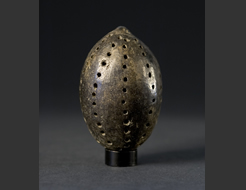|
||||||||||||||||||||||||||||||||
|
|
Museum of: Berlin | |||||||||||||||||||||||||||||||
| Name of the artefact: Rattle | ||||||||||||||||||||||||||||||||
|
Rattle in form of a lemon with holes |
||||||||||||||||||||||||||||||||
|
WHERE IS IT AND MAIN
CHARACTERISTICS |
STATE |
|||||||||||||||||||||||||||||||
|
Department: |
Museum for Pre- and Early
History |
Preservation: |
Very good | |||||||||||||||||||||||||||||
|
Inventory number: |
If 6065 |
Restauration: |
No restored | |||||||||||||||||||||||||||||
|
Name of the artefact: |
Rattle |
Completeness: |
Complete | |||||||||||||||||||||||||||||
|
Object type: |
Other |
|||||||||||||||||||||||||||||||
|
Material: |
Clay |
|||||||||||||||||||||||||||||||
|
Methof of manufacture: |
Pottery |
|||||||||||||||||||||||||||||||
|
Decoration
type: |
No decoration |
|||||||||||||||||||||||||||||||
|
Distinctive mark: |
Rattle in form of a lemon with
holes |
|||||||||||||||||||||||||||||||
|
DIMENSIONS |
PERIOD OF USE |
|||||||||||||||||||||||||||||||
|
Length (mm): |
- |
Epoque: |
Bronze Age |
|||||||||||||||||||||||||||||
|
Heigth
(mm): |
75 |
Culture: |
Lusatian culture |
|||||||||||||||||||||||||||||
|
Diameter
(mm): |
45 |
Period: |
Late Bronze Age |
|||||||||||||||||||||||||||||
|
Width (mm): |
- |
Face: |
- |
|||||||||||||||||||||||||||||
|
Thickness (mm): |
- |
Absolute chronology: |
11 - 8 century BC |
|||||||||||||||||||||||||||||
|
Weight
(g): |
78 |
|||||||||||||||||||||||||||||||
DISCOVERY |
||||||||||||||||||||||||||||||||
|
Date: |
Purchased in 1894 |
Country: |
Germany |
|||||||||||||||||||||||||||||
|
District: |
Brandenburg |
Town hall affiliation: |
Lkr. Potsdam-Mittelmark |
|||||||||||||||||||||||||||||
|
Village: |
Lüsse |
Discovery findspot: |
Unknown |
|||||||||||||||||||||||||||||
|
Condition of discovery: |
Archaeological excavation |
Discovery type: |
Grave |
|||||||||||||||||||||||||||||
|
ANALYSES – DETERMINATIONS |
FILLED IN BY |
|||||||||||||||||||||||||||||||
|
Type: |
- |
Name: |
Dr. Manfred Nawroth |
|||||||||||||||||||||||||||||
|
Laboratory: |
- |
Institution: |
Museum for Pre- and early
History |
|||||||||||||||||||||||||||||
|
No./Code: |
- |
Date: |
11/11/2005 |
|||||||||||||||||||||||||||||
|
DEEPENINGS |
||||||||||||||||||||||||||||||||
|
Morphology of the object: |
||||||||||||||||||||||||||||||||
|
The small rattle in form of a lemon was formed bay
hand. The hollow body is decorated with a lot of holes. Inside there is a
small ball for making sounds. |
||||||||||||||||||||||||||||||||
|
Decoration: |
||||||||||||||||||||||||||||||||
|
Holes |
||||||||||||||||||||||||||||||||
|
Inscription: |
||||||||||||||||||||||||||||||||
|
- |
||||||||||||||||||||||||||||||||
|
Analogies: |
||||||||||||||||||||||||||||||||
|
Rattles are known in the Lusatian culture in form of
birds, or as in this case, in form of a lemon. |
||||||||||||||||||||||||||||||||
|
Interpretation: |
||||||||||||||||||||||||||||||||
|
Music instruments are known since the Paleolithic
period. During the Bronze Age instruments like lures were developed as
masterpieces by metalworkers an sued as wind-instruments. Rattles can be
used as rhythm instruments, by ritual practises or as children’s
toys. |
||||||||||||||||||||||||||||||||
|
Bibliography: |
||||||||||||||||||||||||||||||||
|
- |
||||||||||||||||||||||||||||||||

